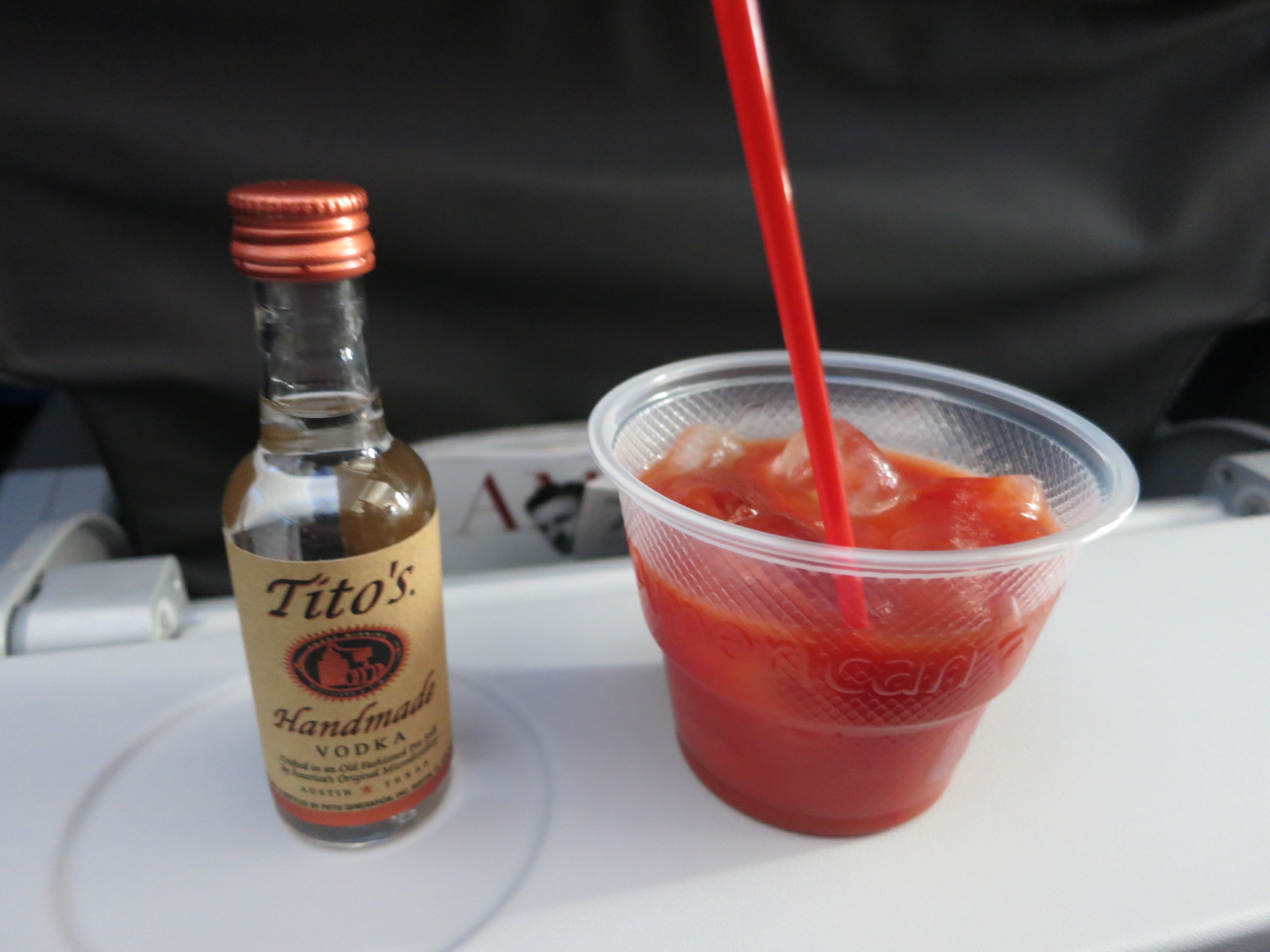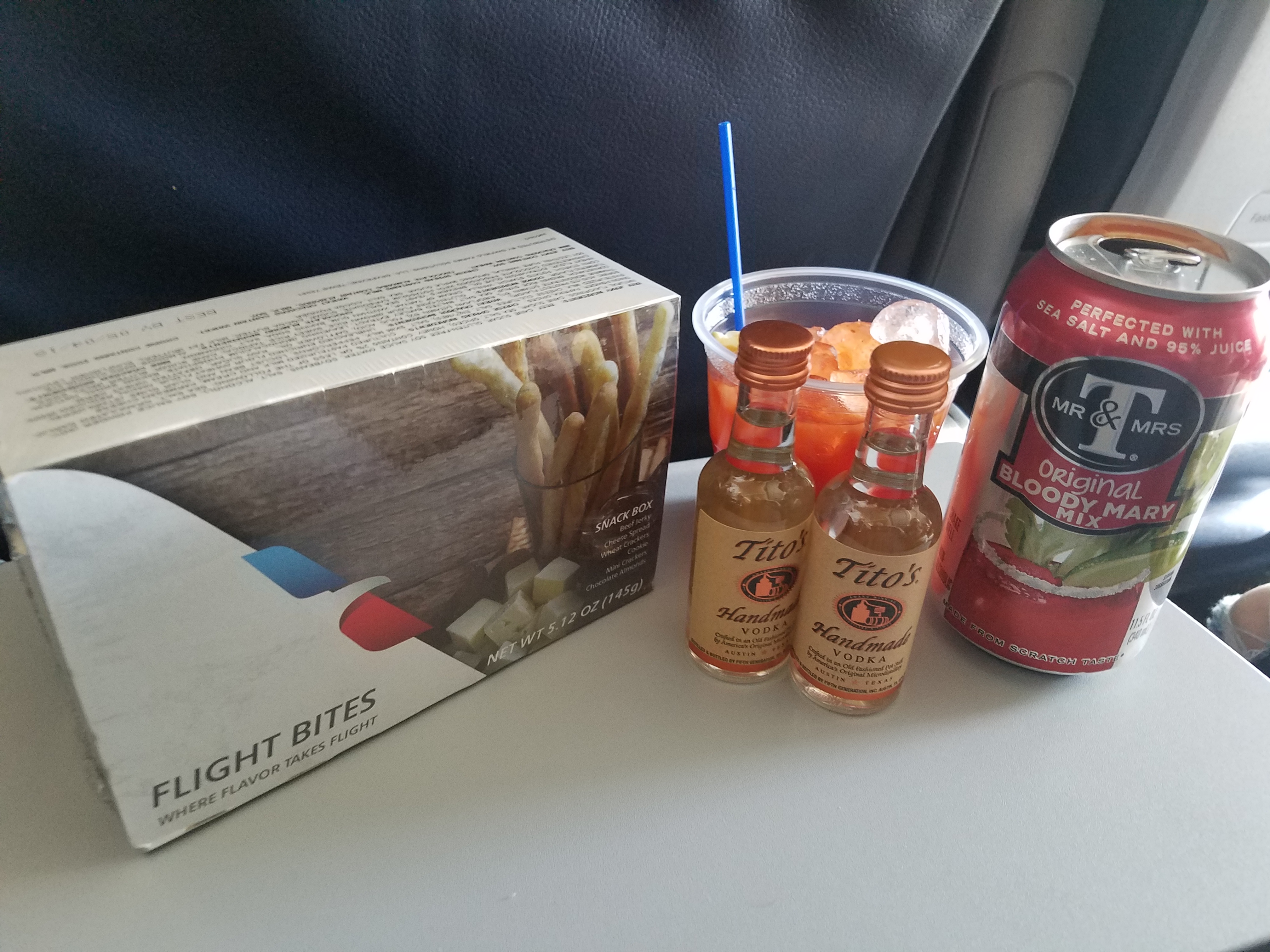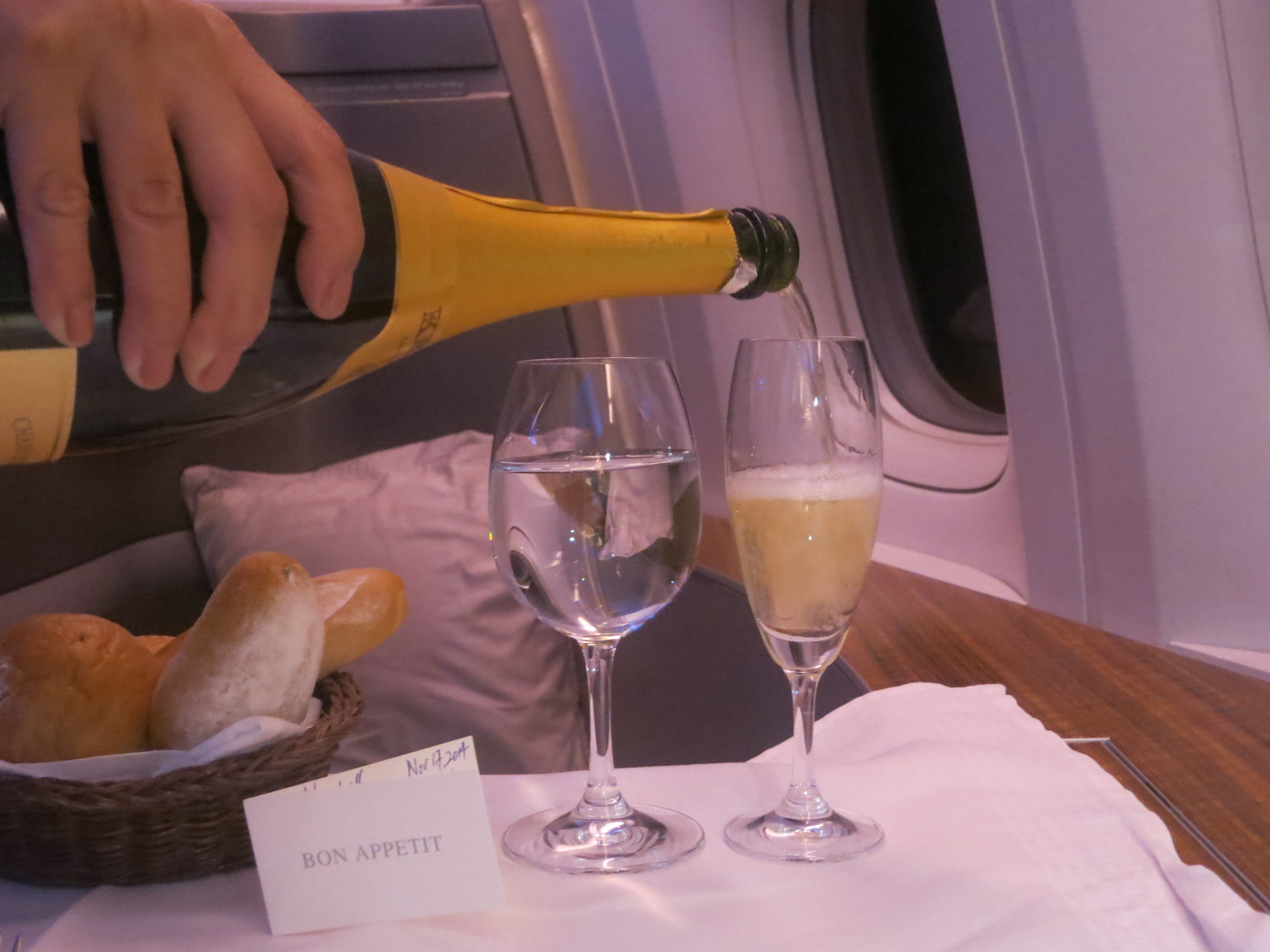There was a push three years ago to have the federal government ban airlines serving alcohol on planes. It didn’t go anywhere, but a new study has thrust this back onto the agenda.
German researchers from the Institute of Aerospace Medicine found that drinking alcohol on flights and then sleeping increases risk of heart attack.
- The study looked at 48 people, between the ages of 18 and 40
- They compared sleep on the ground to sleep in the air, and sleep without alcohol and sleep after alcohol
- The 24 people who drank alcohol in simulated flight conditions “experienced the most heightened heart rates and the lowest oxygen-blood levels.”
Even in young and healthy individuals, the combination of alcohol intake with sleeping under hypobaric conditions poses a considerable strain on the cardiac system and might lead to exacerbation of symptoms in patients with cardiac or pulmonary diseases. Our findings strongly suggest that the inflight consumption of alcoholic beverages should be restricted.

It’s a small study, monitoring the drinking of just 24 people. We’ve had real-world studies of serving alcohol to passengers on planes since the 1940s without significant harm. Nonetheless, echoing these researchers there will be calls that “the inflight consumption of alcoholic beverages should be restricted” (rather than leaving such choices up to passengers themselves).
And there is a real cost to such alcohol bans. During the pandemic there were numerous alcohol-fueled incidents on planes that point to why we shouldn’t ban alcohol on planes.
- Airlines had generally stopped serving alcohol inflight, at least in economy
- So passengers were pregaming
- And buying alcohol ‘to go’ inside the airport to sneak on board
- With a limited window in which to drink, they were drinking too much.

In turns out that when airlines sell and serve inflight, that’s better for controlling consumption than an alcohol ban – which causes passengers to sneak on and overindulge, fearing they won’t have access to it otherwise. Removing alcohol from the cabin paradoxically increases passenger intoxication at least earlier in the flight for long haul.
Rules than would ban selling alcohol, of course, wouldn’t mean that consumption on board is illegal. It is only illegal to drink your own alcohol that you serve yourself. If you bring it, and a flight attendant serves it to you, that’s perfectly fine.
Many airlines won’t do this. Last year Air India banned passengers from buying liquor at duty free and then drinking it on board. Cathey Pacific will generally serve you alcohol you’ve brought on board, at least in premium cabins.

Sara Nelson tried to get an inflight alcohol ban done, and even barking orders at then-House Transportation and Infrastructure Committee Chairman Pete DeFazio it didn’t happen (though DeFazio, following orders, tried).
The call to ban on board alcohol isn’t new. It dates back to the mid-1950s, during the 84th Congress, when Senator Strom Thurmond introduced legislation that would end what he called “flying saloons.”
Thurmond served 48 years in the Senate. Prior to that he was Governor of South Carolina. And he ran for President in 1948 as a segregationist, actually winning four states.
Thurmond argued in front of the Senate for a complete ban on alcohol. He explained that he abstained from drinking, but that his reasons for wanting it banned for others inflight were several,
- Safety. Thurmond contended that “the unregulated consumption of liquor by air line passengers is a compromise with safety” because “an intoxicated passenger [might] seize control of an aircraft while in flight or..distract the pilots from their duties so as to jeopardize many lives.”
- Too much work for flight attendants. Just like Sara Nelson, Thurmond complained that alcohol service “places an unnecessary burden upon the flight crews who are charged with the safety and comfort of air line passengers.”
Thurmond continued, “Miss Peterson, the representative of the stewardesses association, has told me of several embarrassing incidents that have occurred on airplanes due to the consumption of liquor by passengers. …[Congress must] protect[..] the dignity of the fine young ladies who serve as stewardesses on these aircraft.”
- Non-drinkers shouldn’t have to be exposed to it. “[D]rinking in airplanes cannot be confined to club cars as on trains. In addition, there is the problem of children who accompany their parents and others on air flights. Moral decency impels us to exclude our children from barrooms and liquor stores. By the same token, our children should be protected from the ‘flying saloons’ which now exist..”
- Drinking and transportation don’t mix. It’s like drinking and driving on steroids because “it takes a smaller quantity of alcohol to intoxicate at a high altitude” (though of course passengers aren’t flying the plane, and pilots don’t drink – they are our designated drivers).
He doubled down on his claim that offering alcohol inflight created a “stigma” for flight attendants “doubling as barmaids.” And he wanted to not just ban service of alcohol but also consumption in flight out of fear that passengers might bring their own.
Thurmond said that a ban on inflight alcohol generated more constituent mail than “the so-called civil rights bill” and was “one of the most vital safety measures facing the Congress” in 1957. Sixty seven years later, we’re still here, legal segregation isn’t, and inflight alcohol service hasn’t been banned by force of law. Abstaining from alcohol, of course, didn’t prevent Strom Thurmond from behaving badly. He was known for inappropriately touching women throughout his career.


@ Gary — Alcohol is by far and away the most destructive drug on earth and should be severely restricted. Good to see these ideas being floated.
A sample size n=24 doesn’t mean a darn thing statistically. Not saying it’s bait-click, there clearly our some passengers who get too drunk, but we need to make sure we don’t confuse correlation with causation.
I’ve never understood selling alcohol on airplanes (aside from the obvious greed aspect). Delta offered me a voucher for a free cocktail recently, and I reacted to it the same way I would to a pack of cigarettes or a subscription to PornHub. 90% of the air rage incidents we see on social media are alcohol fueled. The solution is right in front of us.
24 samples lol… I had to brush up on z-scores from my college days to avoid dying of laughter. More “Studies show….” And “Doctors say…” nonsense…
Unfortunately heart disease is on the rise fast and already clearly the #1 killer for some time
Its not so simple as its proper diet nutrition exercise and non angry instead happy lifestyle keeping your weight down etc
Avoiding processed and fast food etc monitoring your blood work results etc
We talk about COVID deaths colonoscopies smoking drinking but no one speaks of heart disease until its to late due to stroke heart attack or worse death
Unfortunately as few get screened until it may likely be to late
As a responsible society we have much work and education to do
Cardiologists and their teams have lifetime job security as folks are dropping one day at a time
Not to mention the drug companies.Doubt they want a cure or a drop in patients when they are making billions.Unfortunately I speak from experience first hand and can write the book
Drink up and Cheers 😉
Cardiologists typically tell patients that live near sea level and with significant heart problems to not stay the night at an elevation of 6,000 feet or higher. My smartwatch typically shows, when at airplane cruising altitude, a cabin pressure elevation of between 6000 and 7000 feet. I think it wise that anyone with, including minor, heart problems and typically living near sea level NOT drink alcohol when flying. But if you must have a drink while flying with a weak heart, then do not fall asleep! This is NOT medical advice. You better ask your cardiologist what he thinks about what I just said.
This is bull$#|+…first of all, @Jon is quite right: a sample of 24 doesn’t mean a damned thing, period. (And, yes, correlation and causation are two very different things!) Secondly, while no one is claiming that alcohol is 100 percent safe and harmless under any and all circumstances, the idea that it should passengers should be banned from consuming a single drop of wine, beer, or spirits is crazy.
From a health viewpoint, the government is not your mother.
From a behavioral standpoint — different issue entirely, but it’s going to come up…again — airlines need to stop selling alcohol to people who are obviously inebriated (their annual profit is not dependent on selling a 50ml of Tito’s or Jack Daniels), and flight attendants need to follow the law.
Serving liquor is a huge moneymaker for the airlines. I would be surprised if it was banned. Folks….just have one okay?
Prohibition was a great success wasn’t it? Let’s assume for the moment that this small study gets the same results when replicated on a larger group of flyers. The logical control group is not non-drinking flyers, but drinking non-flyers. To know if flying and drinking is the problem, you’d need to know whether non-flyers experienced the same issues as the flying consumers of alcohal. If not, there’s no indication that flying is the problem with consuming alcohol.
Pressing the call button and asking for anything causes heart attacks too right? Who paid for this “study”…AFA?
“Alcohol is by far and away the most destructive drug on earth and should be severely restricted.”
Spoken like a good little tyrant. Gene needs to brush up on his history.
Alcohol is my only food on airplanes . I have many problems , but heart ailments are not among them . If I wanted to avoid heart problems , I would avoid rich fatty food served on airplanes .
@Gene … the most destructive drug on earth is not alcohol … it is woke ideology .
@ James N and Alert — You are both 100% incorrect. Trying do a little reading.
In my opion, those that drink BEFORE boarding an aircraft cause more disturbances and issues than those that are served after becoming airborne.
“Great” comeback, Gene. Who exactly are you proposing should “regulate” alcohol?
Flying on a plane increases your risk of dying in a plane crash by 100%. Ban flying.
If we’re gonna ban activities that might be bad for us, then there is no limit to what the government could ban. So just stop with this stupidity, let people live their lives, make their choices, and live with and pay for the consequences (that’s the key part, and the insideous nature of socialized medicine…now personal freedoms are attacked because the negative consequences are taken on by society).
@Gene … Prohibition was a failure . Hello ? Anyone home ?
I need a drink
@Mantis … +1 . Also , alcohol has never been bad for me , and I’ve never had any adverse consequences . Recall that water was turned into wine , and that was a good thing .
a very small study that doesn’t tell us anything we didn’t know before but provides the basis for a new topic that will get more replies than the number of people studied in an uncontrolled setting.
You know what we have from 60 years of jet-age flying? Actual data! What is the rate of heart attacks on planes vs. what we would expect to see for the same group just sitting on the ground. Pretty sure if you have a heart attack on a plane they’re going to have to wheel you or your body off the plane, so the data surely exists. We know how often people have heart attacks in the real world, so an excess of heart attacks should be pretty obvious. Now maybe we don’t have data about who was drinking, and maybe just the stress of flying causes heart attacks, but real world data is surely more interesting than a sample size of 24 from a simulation.
Oh, look! Real data!
“In the largest observational study of medical emergencies during air travel, which analyzed data of 744 million airline passengers between 2008 and 2010, the medical incidence rate was reported to be 1.6 per 100 000 passengers, with medical deaths occurring in 36 passengers. Cardiac causes represent 8% of the medical emergencies, whereas cardiac arrest was the most common cause of medical death (31/36) and flight diversion.”
And
“Every year about 805,000 Americans have a heart attack.”
So, if the population of the US is 333 million, that means the heart attack rate is 241.7 per 100,000. If cardiac causes represent 8% of medical emergencies on airplanes, and for the sake of argument we say all of those are heart attacks, that means they happen at a rate of 0.128 per 100,000. Or, heart attacks on airplanes represent .053% of all heart attacks. Making a bad assumption that heart attacks occur at even spaced random times 0.053% of a year is 4.64 hours. There are an average of 2.9 million passengers a day, the average flight time in the US is 1.5 hours, multiply that out and there are 1.588 billion passenger hours per year. Divide that by 333 million Americans and the average American is in the air 4.76 hours per year. 4.76 vs. 4.64! Amazingly close to what you would expect the average number of airborne heat attacks to be, even with all my bad assumptions.
The Neoprohibitionists grasp at straws. As the old joke goes, due to healthy habits, the life expectency in Utah is the longest in the US. You might live forever, but you’ll wish you were dead.
Mantis nails it.
“Once the principle is admitted that it is the duty of government to protect the individual against his own foolishness, no serious objections can be advanced against further encroachments.” Ludwig von Mises
“Of all tyrannies, a tyranny sincerely exercised for the good of its victims may be the most oppressive. It may be better to live under robber barons than under omnipotent moral busybodies. The robber baron’s cruelty may sometimes sleep, his cupidity may at some point be satiated; but those who torment us for our own good will torment us without end, for they do so with the approval of their own conscience.” C.S. Lewis
So, if they restrict in flight alcohol, what is to keep them from boarding intoxicated?
Curious how defensive and enraged some people are when it is simply suggested that alcohol might be bad in any way.
Banning alcohol on flights is about as likely as hotels cutting out maid services in hotel rooms to protect the environment. Couldn’t possibly happen.
Useless unless you also shut down alcohol service at airports.
Yet another of the totally worthless studies no doubt funded for some wacky academicians with nothing else to do!
@ James N anyone who quotes LVM merits a free drink from me.
I drink more than my doctor recommends. I can drink free on every flight I take. I drink about 5% of the time on flights. While I understand that 24 subjects isn’t crazy low for drawing conclusions, I don’t care. Leave us alone.
Champagne !
( on AirFrance, also in Economy )
While I very rarely consume alcohol on a flight, I would suggest that banning it on the aircraft would definitely lead to more problems both for passengers and flight attendants. Does anyone remember COVID when they stopped serving alcohol and you were lucky to get even water? Passengers took to imbibing far more alcohol at the airport prior to boarding. That led to a marked increase in unruly behavior. If there was a 2 drink limit that might be a better solution rather than banning alcohol altogether.
@Gene, you are welcome to abstain and leave everyone else to their choices.
While we are at it, can someone please ban these nonsense so called “Studies”. We do not need to continue throwing money at them.
What a poorly designed, useless study. How much did their heart rate increase and oxygen saturation drop? What co-morbidities did they have? How were participants selected? Who funded the study? Just a few of the many unanswered questions about this poorly designed study that should not be used to change any type of practice. I’m not a fan of drunk obnoxious people on the plane or anywhere but please……. Plus I’m sure the airlines don’t want to lose the revenue earned on inflight alcohol Sales.
Solution in search of a problem.
The same twats that complain religiously about how bad alcohol is eat gummies and marijuana products like their tic tacs.
All for individual choices. Let folks do whatever they want as long as they don’t bother other folks. If they die because of their choice, no problem. Far better than dying from cross fire between two insane forces trying to kill each other in Gaza that you have nothing to do with.
1. No smoking. 2. No drinking? 3. No gambling. (I mean, gaming.) When are the airlines going to follow the cruise lines and install casinos aboard aircraft? Or maybe no drinking will induce more travelers to take Amtrak for their drinking travel. 2024 U.S. travel is weird.